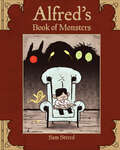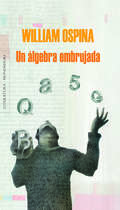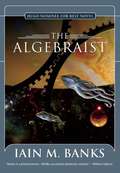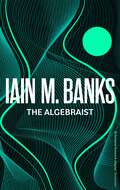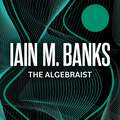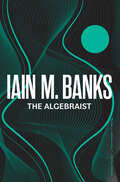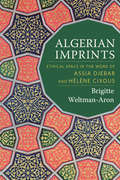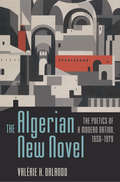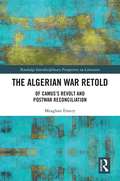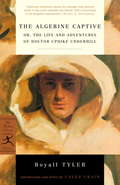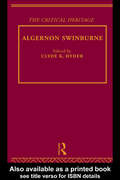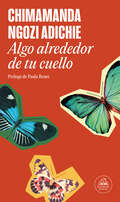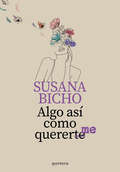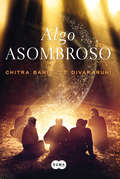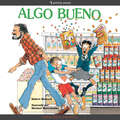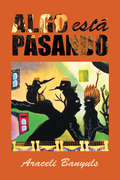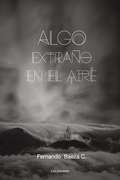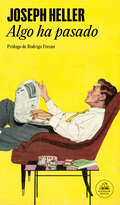- Table View
- List View
Alfred's Book of Monsters
by Sam StreedTrick or treat?With nods to Tim Burton, Edward Gorey, and Neil Gaiman, this humorous picture book about a Victorian boy obsessed with monsters presents a dark and appealing world, created by debut author/illustrator Sam Streed.In the graveyard, between stone monuments for forgotten souls, lurks the Black Shuck. . . . Its one blood-red eye burns with an undying rage.After reading about the slimy Nixie, the angry Black Shuck, and the creepy Lantern Man in his beloved Book of Monsters, Alfred decides to invite the monsters to teatime with his crusty old aunty, who thinks monsters are an improper obsession for a respectable young boy.
Un álgebra embrujada
by William OspinaPersonajes de la talla de Poe, Neruda, Chesterton y Shakespeare sondescritos por la exquisita pluma de William Ospina. De poetas y soñadores, de sortilegios y malabarismos, está hecho estelibro de ensayos. Y en efecto, como un hechicero que va sumandoingredientes a su humeante marmita, William Ospina ha convocado lasartes mágicas de Poe y Chesterton, de Eliot y Neruda; de Alfonso Reyes yEstanislao Zuleta; de José Asunción Silva y Jorge Isaacs; de Quevedo,Shakespeare, Dickens y Borges, para conmovernos hasta lo más hondo yllevarnos a tener la implacable certeza de que la vida sin ellos, sinsus textos, sería menos luminosa, perdería mucha de su gracia.
The Algebraist
by Iain M. BanksA space opera by the British author who many believe to be its best proponent and who certainly was the first of the modern British writers to return to the form.
The Algebraist
by Iain M. BanksA superb standalone novel from the awesome imagination of Iain M. Banks, a master of modern science fiction. It is 4034 AD. Humanity has made it to the stars. Fassin Taak, a Slow Seer at the Court of the Nasqueron Dwellers, will be fortunate if he makes it to the end of the year.The Nasqueron Dwellers inhabit a gas giant on the outskirts of the galaxy, in a system awaiting its wormhole connection to the rest of civilisation. In the meantime, they are dismissed as decadents living in a state of highly developed barbarism, hoarding data without order, hunting their own young and fighting pointless formal wars.Seconded to a military-religious order he's barely heard of - part of the baroque hierarchy of the Mercatoria, the latest galactic hegemony - Fassin Taak has to travel again amongst the Dwellers. He is in search of a secret hidden for half a billion years. But with each day that passes a war draws closer - a war that threatens to overwhelm everything and everyone he's ever known.As complex, turbulent and spectacular as the gas giant on which it is set, this novel from Iain M. Banks is space opera on a truly epic scale.Praise for Iain M. Banks:'Epic in scope, ambitious in its ideas and absorbing in its execution' Independent on Sunday'Banks has created one of the most enduring and endearing visions of the future' Guardian'Jam-packed with extraordinary invention' Scotsman'Compulsive reading' Sunday Telegraph The Culture series:Consider PhlebasThe Player of GamesUse of WeaponsThe State of the ArtExcessionInversionsLook to WindwardMatterSurface DetailThe Hydrogen SonataOther books by Iain M. Banks:Against a Dark BackgroundFeersum EndjinnThe Algebraist
The Algebraist
by Iain M. BanksIt is 4034 AD. Humanity has made it to the stars. Fassin Taak, a Slow Seer at the Court of the Nasqueron Dwellers, will be fortunate if he makes it to the end of the year.The Nasqueron Dwellers inhabit a gas giant on the outskirts of the galaxy, in a system awaiting its wormhole connection to the rest of civilisation. In the meantime, they are dismissed as decadents living in a state of highly developed barbarism, hoarding data without order, hunting their own young and fighting pointless formal wars.Seconded to a military-religious order he's barely heard of - part of the baroque hierarchy of the Mercatoria, the latest galactic hegemony - Fassin Taak has to travel again amongst the Dwellers. He is in search of a secret hidden for half a billion years. But with each day that passes a war draws closer - a war that threatens to overwhelm everything and everyone he's ever known.As complex, turbulent, flamboyant and spectacular as the gas giant on which it is set, the new science fiction novel from Iain M. Banks is space opera on a truly epic scale.
The Algebraist (Culture)
by Iain M. BanksAs complex, turbulent and spectacular as the gas giant on which it is set, this novel from Iain M. Banks is space opera on a truly epic scale. &“An enormously enjoyable book, full of wonderful aliens, a sense of wonder and subtle political commentary on current events.&” –Publishers Weekly (Starred Review) It is 4034 AD. Humanity has made it to the stars. Fassin Taak, a Slow Seer at the Court of the Nasqueron Dwellers, will be fortunate if he makes it to the end of the year. The Nasqueron Dwellers inhabit a gas giant on the outskirts of the galaxy, in a system awaiting its wormhole connection to the rest of civilization. In the meantime, they are dismissed as decadents living in a state of highly developed barbarism, hoarding data without order, hunting their own young and fighting pointless formal wars. Seconded to a military-religious order he's barely heard of - part of the baroque hierarchy of the Mercatoria, the latest galactic hegemony - Fassin Taak has to travel again amongst the Dwellers. He is in search of a secret hidden for half a billion years. But with each day that passes a war draws closer - a war that threatens to overwhelm everything and everyone he's ever known. &“Banks is a phenomenon...writing pure science fiction of a peculiarly gnarly energy and elegance.&” –William Gibson &“Banks writes with a sophistication that will surprise anyone unfamiliar with modern science fiction.&” –The New York TimesFor More from Iain M. Banks, check out:The Culture series:Consider Phlebas The Player of Games Use of Weapons The State of the Art Excession Inversions Look to Windward Matter Surface Detail The Hydrogen Sonata
The Algebraist
by Iain M. BanksThe novels of Iain M. Banks have forever changed the face of modern science fiction. With breathtaking imagination and extraordinary storytelling, they have secured his reputation as one of the most extraordinary and influential writers in the genre.'Banks is a phenomenon' William Gibson It is 4034 AD. Humanity has made it to the stars but Fassin Taak, a Slow Seer at the Court of the Nasqueron Dwellers, will be fortunate if he makes it to the end of the year.The Nasqueron Dwellers inhabit a gas giant on the outskirts of the galaxy, in a system awaiting its wormhole connection to the rest of civilisation. In the meantime, they are dismissed as decadents living in a state of highly developed barbarism, hoarding data without order, hunting their own young and fighting pointless formal wars.Abruptly seconded to a military-religious order he's barely heard of - part of the baroque hierarchy of the Mercatoria, the latest galactic hegemony - Fassin Taak has to travel again amongst the Dwellers. He is in search of a secret hidden for half a billion years.But with each day that passes a war draws closer - a war that threatens to overwhelm everything and everyone he's ever known.Praise for the novels of Iain M. Banks:'Epic in scope, ambitious in its ideas and absorbing in its execution' Independent on Sunday'Banks has created one of the most enduring and endearing visions of the future' Guardian'Jam-packed with extraordinary invention' Scotsman'Compulsive reading' Sunday Telegraph Books by Iain M. Banks:Consider PhlebasThe Player of GamesUse of WeaponsExcessionInversionsLook to WindwardMatterSurface DetailThe Hydrogen SonataThe State of the ArtAgainst a Dark BackgroundFeersum EndjinnThe AlgebraistAlso now available: The Culture: The Drawings - an extraordinary collection of original illustrations faithfully reproduced from sketchbooks Banks kept in the 1970s and 80s, depicting the ships, habitats, geography, weapons and language of Banks' Culture series of novels in incredible detail.
The Algebraist
by Iain M. BanksThe novels of Iain M. Banks have forever changed the face of modern science fiction. With breathtaking imagination and extraordinary storytelling, they have secured his reputation as one of the most extraordinary and influential writers in the genre.'Banks is a phenomenon' William Gibson It is 4034 AD. Humanity has made it to the stars but Fassin Taak, a Slow Seer at the Court of the Nasqueron Dwellers, will be fortunate if he makes it to the end of the year.The Nasqueron Dwellers inhabit a gas giant on the outskirts of the galaxy, in a system awaiting its wormhole connection to the rest of civilisation. In the meantime, they are dismissed as decadents living in a state of highly developed barbarism, hoarding data without order, hunting their own young and fighting pointless formal wars.Abruptly seconded to a military-religious order he's barely heard of - part of the baroque hierarchy of the Mercatoria, the latest galactic hegemony - Fassin Taak has to travel again amongst the Dwellers. He is in search of a secret hidden for half a billion years.But with each day that passes a war draws closer - a war that threatens to overwhelm everything and everyone he's ever known.Praise for the novels of Iain M. Banks:'Epic in scope, ambitious in its ideas and absorbing in its execution' Independent on Sunday'Banks has created one of the most enduring and endearing visions of the future' Guardian'Jam-packed with extraordinary invention' Scotsman'Compulsive reading' Sunday Telegraph Books by Iain M. Banks:Consider PhlebasThe Player of GamesUse of WeaponsExcessionInversionsLook to WindwardMatterSurface DetailThe Hydrogen SonataThe State of the ArtAgainst a Dark BackgroundFeersum EndjinnThe AlgebraistAlso now available: The Culture: The Drawings - an extraordinary collection of original illustrations faithfully reproduced from sketchbooks Banks kept in the 1970s and 80s, depicting the ships, habitats, geography, weapons and language of Banks' Culture series of novels in incredible detail.
The Algebraist
by Iain M. BanksThe novels of Iain M. Banks have forever changed the face of modern science fiction. With breathtaking imagination and extraordinary storytelling, they have secured his reputation as one of the most extraordinary and influential writers in the genre.'Banks is a phenomenon' William Gibson It is 4034 AD. Humanity has made it to the stars but Fassin Taak, a Slow Seer at the Court of the Nasqueron Dwellers, will be fortunate if he makes it to the end of the year.The Nasqueron Dwellers inhabit a gas giant on the outskirts of the galaxy, in a system awaiting its wormhole connection to the rest of civilisation. In the meantime, they are dismissed as decadents living in a state of highly developed barbarism, hoarding data without order, hunting their own young and fighting pointless formal wars.Abruptly seconded to a military-religious order he's barely heard of - part of the baroque hierarchy of the Mercatoria, the latest galactic hegemony - Fassin Taak has to travel again amongst the Dwellers. He is in search of a secret hidden for half a billion years.But with each day that passes a war draws closer - a war that threatens to overwhelm everything and everyone he's ever known.Praise for the novels of Iain M. Banks:'Epic in scope, ambitious in its ideas and absorbing in its execution' Independent on Sunday'Banks has created one of the most enduring and endearing visions of the future' Guardian'Jam-packed with extraordinary invention' Scotsman'Compulsive reading' Sunday Telegraph Books by Iain M. Banks:Consider PhlebasThe Player of GamesUse of WeaponsExcessionInversionsLook to WindwardMatterSurface DetailThe Hydrogen SonataThe State of the ArtAgainst a Dark BackgroundFeersum EndjinnThe AlgebraistAlso now available: The Culture: The Drawings - an extraordinary collection of original illustrations faithfully reproduced from sketchbooks Banks kept in the 1970s and 80s, depicting the ships, habitats, geography, weapons and language of Banks' Culture series of novels in incredible detail.
Algeria: The Dark Decade of Terrorism (Novel #1)
by Bellaredj BoudaoudIn this story, the author denounces religious fanaticism, assassins, attacks, intolerance, hypocrisy and even a total incomprehension of Islam. A religion that preaches peace and not violence. Generally speaking, violence is inherent in human nature. It takes a commendable effort to suppress it. Our father Adam had two sons: one killed the other. Monotheistic religions strive to neutralize tendencies towards violence through patience, piety and love of neighbor. The author portrays here a realistic and sometimes picturesque image of the life of a people he loves, plunged into the chaos of history, with its violence and dangers, its hopes and passions. Little by little, the truth and exactitude of the details, the non-documentary precision, A religion that preaches peace and not violence.
Algerian Imprints: Ethical Space in the Work of Assia Djebar and Hélène Cixous
by Brigitte Weltman-AronBorn and raised in French Algeria, Assia Djebar and Hélène Cixous represent in their literary works signs of conflict and enmity, drawing on discordant histories so as to reappraise the political on the very basis of dissensus.In a rare comparison of these authors' writings, Algerian Imprints shows how Cixous and Djebar consistently reclaim for ethical and political purposes the demarcations and dislocations emphasized in their fictions. <P><P>Their works affirm the chance for thinking afforded by marginalization and exclusion and delineate political ways of preserving a space for difference informed by expropriation and nonbelonging. Cixous's inquiry is steeped in her formative encounter with the grudging integration of the Jews in French Algeria, while Djebar's narratives concern the colonial separation of "French" and "Arab," self and other. Yet both authors elaborate strategies to address inequality and injustice without resorting to tropes of victimization, challenging and transforming the understanding of the history and legacy of colonized space.
The Algerian New Novel: The Poetics of a Modern Nation, 1950-1979
by Valérie K. OrlandoDisputing the claim that Algerian writing during the struggle against French colonial rule dealt almost exclusively with revolutionary themes, The Algerian New Novel shows how Algerian authors writing in French actively contributed to the experimental forms of the period, expressing a new age literarily as well as politically and culturally. Looking at canonical Algerian literature as part of the larger literary production in French during decolonization, Valérie K. Orlando considers how novels by Rachid Boudjedra, Mohammed Dib, Assia Djebar, Nabile Farès, Yamina Mechakra, and Kateb Yacine both influenced and were reflectors of the sociopolitical and cultural transformation that took place during this period in Algeria. Although their themes were rooted in Algeria, the avant-garde writing styles of these authors were influenced by early twentieth-century American modernists, the New Novelists of 1940s–50s France, and African American authors of the 1950s–60s. This complex mix of influences led Algerian writers to develop a unique modern literary aesthetic to express their world, a tradition of experimentation and fragmentation that still characterizes the work of contemporary Algerian francophone writers.
The Algerian War Retold: Of Camus’s Revolt and Postwar Reconciliation (Routledge Interdisciplinary Perspectives on Literature)
by Meaghan EmeryThe Algerian War Retold: Of Camus’s Revolt and Postwar Reconciliation focuses on specific aspects of Albert Camus’s ethical thought through a study of his writings in conjunction with late 20th- and early 21st-century works written by Franco-Maghrebi authors on the topic of the Algerian War (1954-1962). It combines historical inquiry with literary analysis in order to examine the ways in which Camus’s concept of revolt -- in his novels, journalistic writing, and philosophical essays -- reverberates in productions pertaining to that war. Following an examination of Sartre’s and Camus’s debate over revolution and violence, one that in another iteration asks whether FLN-sponsored terrorism was justified, The Algerian War Retold uncovers how today’s writers have adopted paradigms common to both Sartre’s and Camus’s oeuvres when seeking to break the silence and influence France’s national narrative. In the end, it attempts to answer the critical questions raised by literary acts of violence, including whether Camusian ethics ultimately lead to justice for the Other in revolt. These questions are particularly poignant in view of recent presidential declarations in response to years of active pressure applied by associations and other citizens’ groups, prompting the French government to acknowledge the state’s abandonment of the harkis, condemn the repression of peaceful protest, and recognize the French army’s systematic use of torture in Algeria.
The Algerine Captive
by Royall TylerAfter the Revolutionary War, American sailors lost the protection of Britain's Royal Navy and were easy prey for the pirates of the North African coast, who captured ships and cargo, enslaved crew, and demanded ransom from the U. S. Motivated by these events, Royall Tyler, the first American-born playwright, poet, and novelist, wrote "The Algerine Captive. " Originally published anonymously in 1797, it tells the tale of fictitious Boston native Dr. Updike Underhill, his capture by Barbary pirates, and their efforts to convert him to their Muslim faith. Written in an entertaining and satiric style that predated Mark Twain, Tyler's novel reveals his patriotic pride and anti-slavery beliefs. His comments on the religious and cultural divide between Western and Islamic beliefs of the day still resonate today.
Algernon Swinburne: The Critical Heritage
by Clyde K. HyderThe Critical Heritage gathers together a large body of critical sources on major figures in literature. Each volume presents contemporary responses to a writer's work, enabling students and researchers to read for themselves, for example, comments on early performances of Shakespeare's plays, or reactions to the first publication of Jane Austen's novels. The carefully selected sources range from landmark essays in the history of criticism to journalism and contemporary opinion, and little published documentary material such as letters and diaries. Significant pieces of criticism from later periods are also included, in order to demonstrate the fluctuations in an author's reputation. Each volume contains an introduction to the writer's published works, a selected bibliography, and an index of works, authors and subjects. The Collected Critical Heritage set will be available as a set of 68 volumes and the series will also be available in mini sets selected by period (in slipcase boxes) and as individual volumes.
Algo alrededor de tu cuello
by Chimamanda Ngozi AdichieEl escritor nigeriano Chimamanda Ngozi Adichie, a solo treinta y un años de edad, ha ganado una extraordinaria reputación, junto con el Premio Orange y una beca MacArthur, en la fuerza de sus dos primeras novelas, Purple Hibiscus y la mitad de un Sol Amarillo.La cosa alrededor de su cuello, su primera colección de cuentos cortos, demuestra que tiene Chimamanda corto de ficción tan seriamente como lo hace la novela. No se trata de tomas o salidas en falso de las novelas de pasado o por venir, o ejercicios de los dedos por un autor relajante en medio de grandes proyectos. Las historias de pie por su cuenta. Sus personajes son tan intrigantes como los de las novelas, y aunque estas historias no son especialmente largos, hay algo importante en juego en cada uno.
Algo alrededor de tu cuello (edición especial limitada)
by Chimamanda Ngozi AdichieChimamanda Ngozi Adichie, autora ganadora del prestigioso premio Orange con su novela Medio sol amarillo, vuelve al territorio de la ficción con este volumen de cuentos, un libro que revela una voz madura crecida en la realidad de un país como Nigeria. -Edición especial limitada con prólogo de Paula Bonet- Conmovedores y profundos, estos relatos cuentan historias humanamente cercanas y geográficamente remotas: historias de mujeres que sufren lejos de su país de origen, historias de emigrantes que se encuentran a sí mismos en América, la tierra prometida. Chimamanda Ngozi Adichie, autora nigeriana, sabe hablar de África alejándose de los titulares manidos sobre ese continente, pero sin dejar de lado la historia de su país. Es una escritora interesada en cómo los asuntos públicos afectan a los individuos, interesada en analizar desde la ficción el choque entre la modernidad yla tradición, las expectativas familiares y los sueños de las nuevas generaciones. Reseñas:«Leer los relatos de Chimamanda Ngozi Adichie es un verdadero placer; la autora pertenece al reducido grupo de jóvenes escritores cuyo talento y sabiduría les separa de su propia generación debido a su gran madurez narrativa.»Yiyun Li «Algo alrededor de tu cuello, nominada al nominada al premio de relato Frank O'Connor International y al John Llewellyn Rhys, es un libro memorable.»The New York Times «Algo alrededor de tu cuello es una lectura perfecta para los tiempos que corren.»Publishers Weekly
Algo así como quererme
by Susana BichoLa primera novela de Susana Bicho: adictiva, emocionante y real. Mina vive en una ciudad de provincias, pero sueña con mudarse a la gran ciudad. Aunque eso suponga dejar la vida que siempre ha conocido, con todo lo que ello conlleva, atrás. Conocer a Julia, una chica con cuya creatividad y desparpajo conecta al instante, le da el impulso que necesita para cumplir su sueño: montar su propia firma de moda en la capital. Pero pronto descubre que la tela con la que están hechas las ilusiones es fina y frágil y, justo cuando todo parece a punto de descoserse, aparece Marcos, que le abrirá las puertas de un mundo que nunca creyó que podría estar a su alcance..., y que tal vez no sea como esperaba. Una historia de superación y crecimiento de alguien que no le tiene miedo a nada. Ni siquiera de aprender a quererse.
Algo asombroso
by Chitra DivakaruniEs tarde en la oficina de expedición de visados y pasaportes de una ciudad americana. La gente ha estado yendo y viniendo, pero ahora solo quedan nueve personas: una adolescente punki, una pareja caucásica de clase alta, un joven musulmán americano, una recién licenciada, un exsoldado afroamericano, una anciana china y dos empleados. De pronto, un terremoto rompe con la paz de la tarde y los atrapa a todos en el edificio. La lucha por la supervivencia hace que el estrés emocional y psicológico se acerque al límite, hasta que uno de ellos sugiere que cada uno cuente una historia personal, algo asombroso que haya ocurrido en sus vidas. De este modo, sus sorprendentes narraciones sobre el amor, el deber, la familia, la política y la muerte se van desvelando a la vez que dejan al descubierto la parte oculta de cada personaje y ayudan al resto a desviar su atención de la terrorífica situación que están viviendo. Una novela sobre los valores, la esperanza, el increíble poder de los relatos y la insignificancia de la condición humana en sí misma.
Algo auténtico
by Selva Palacios¿Será verdad eso de que los polos opuestos se atraen? Porque cuando el amor es auténtico siempre gana, aunque todo lo demás no lo sea. Leonor de Polanco proviene de una familia bien entre cuyos miembros destacan personajes relevantes de la alta sociedad. Para ella, su carrera profesional es lo más importante, por eso es una mujer de éxito que intenta demostrar constantemente su valía lejos de la sombra de su padre. ¿Por qué entonces acaba dirigiendo el departamento de recursos humanos de Murprisa, una fábrica en Palencia? Por supuesto, la primera vez que la ve, Víctor no se hace esta pregunta. Y no tiene idea de quién es esa preciosidad a la que parece faltarle el aire, pero enseguida lo averiguará. Pronto, no les quedará más remedio que enfrentarse en la sala de juntas. Víctor es el líder del sindicato de Murprisa. Una persona humilde y trabajadora, y a mucha honra. También es un poquito canalla y la vida le ha enseñado a no tomarse las cosas demasiado a pecho. Quizá por eso siempre acaba consiguiendo lo que se propone. Una comedia romántica que se mueve entre dos dualidades continuas. Cuando los secretos de dos personas muy distintas entre sí salen a la luz, no les quedará más remedio que caer rendidos en los brazos del otro.
Algo bueno
by Michael Martchenko Robert Munsch"Algo bueno" es exactamente lo que Tyya, Andrew y Julie quieren poner en su carrito de compras. El papá de Tyya nunca compra nada bueno en la tienda: ni helado, ni galletas, ni chocolate. Pero cuando la señora de la tienda pone en la nariz de Tyya una etiqueta con un precio, su papá finalmente se ve obligado a comprar algo bueno. Este es un libro electrónico de diseño fijo, que mantiene el mismo diseño y formato de la edición impresa del mismo libro.
Algo de Wicca Vem Por Aí
by Celeste HallTudo começou em uma véspera fria de outubro de 1954. Usando uma oferta simbólica de um estranho novo e bonito da cidade, um grupo de jovens bruxas lançou um feitiço para tornar sua cidade um ímã para os outros da sua espécie. Mas a bruxaria pode ser muito específica. No momento em que elas descobrem que ele é um metamorfo, o feitiço já foi lançado e Aspire,em Nova Iorque, nunca será o mesma. Este é um pequeno prólogo de uma série de romances pagãos envolvendo metamorfos e bruxas. Existem algumas situações sugestivas e nudez, mas essas histórias são seguras para a maioria dos adolescentes maduros e jovens adultos leitores.
Algo está pasando
by Araceli Banyuls«Algo está pasando y no solo en estos relatos: ¡La mente humana está desequilibrada!» En nombre de Dios o de Alá se sigue matando. La amenaza entristece los ojos del ciudadano de a pie. ¡Qué desconcierto, qué inmoral y trágico! Y así vivimos, aunque todavía nos queda: una esperanza, la luz de arriba, las abejas, el violín, los árboles que hablan, la música y la poesía. "La mente ordena, el corazón calla". El corazón no puede callar, hemos de escucharle.
Algo extraño en el aire
by Fernando Baeza C.Milenarios y extraños sucesos se desencadenan cuando un siniestro juramento contraído por un niño durante la Segunda Guerra Mundial comienza a hacerse realidad. Pero es solo el comienzo... Mijaíl es el nexo entre dos potencias nucleares que han firmado un pacto secreto. Pero ignora que sobre él pesa una antigua maldición generacional... <P><P>Solo un poder superior al destino podrá salvarle. Terroristas islámicos intentan apoderarse de misiles nucleares que aún permanecen activos en las antiguas repúblicas que conformaron la extinta Unión Soviética. Su intención es amedrentar y presionar a la comunidad internacional en contra de Israel, Estados Unidos y Europa. <P><P>En una operación secreta conjunta, americanos y rusos tratan de poner lejos del alcance de los terroristas estas armas de destrucción masiva, enviándolas al Cono Sur de América, en el fin del mundo. <P><P>Mijaíl cree que su participación es clave en esta operación, pero ignora que una oscura maldición ancestral le acecha escondida en el tiempo, esperando que un fatídico plazo se cumpla para hacerse realidad. Fuerzas malignas superiores al destino serán liberadas... y nadie podrá detenerlas.
Algo ha pasado
by Joseph HellerUn gran clásico americano sobre el estilo de vida estadounidense y la cultura del trabajo de los años sesenta. Con prólogo de Rodrigo Fresán. «¿Es bueno este libro? Sí. Su estilo es espléndido e hipnótico».Kurt Vonnegut Joseph Heller, abrumado por la expectativa que había generado Trampa 22, su primera novela, publicada en 1961, tardó trece años en escribir Algo ha pasado. Confiaba tanto en la historia que iba escondiendo borradores por todo Manhattan para que el manuscrito estuviera a salvo si algún día se incendiaba su apartamento. Sus paranoias no fueron en vano: décadas después de su publicación, sigue resonando como «la Gran Novela Americana de la Familia y la Oficina», tal y como la define Rodrigo Fresán en el extraordinario prólogo de esta nueva edición. Esta novela relata la historia de Bob Slocum, un hombre de mediana edad con una vida aparentemente envidiable. Tiene una bonita casa en Connecticut, una esposa atractiva y tres hijos, además de un importante cargo en una empresa y un harén de amantes por toda Manhattan. Pero pese a encarnar la idea misma del ejecutivo exitoso, todo le genera angustia: la amenaza de ser degradado de su empleo, el odio por recibir órdenes o el desmoronamiento de su familia son temores que le empujan a una espiral de desasosiego que solo terminará cuando afronte una verdad ineludible, algo que no quiere saber pero que le acecha desde hace tiempo. En esta espiral de locura de un antihéroe que lucha por escapar de sí mismo, Heller compone un desgarrado solo de voz que se ha convertido con el tiempo en una obra maestra de la literatura. Críticas:«¿Es bueno este libro? Sí. Su estilo es espléndido e hipnótico. Es cristalino y afilado como un diamante. La concentración y la paciencia del Sr. Heller son tan evidentes en cada página que uno solo puede decir que Algo ha pasado es precisamente lo que él esperaba que fuera en todos los aspectos».Kurt Vonnegut, The New York Times Book Review «La gran tragedia del mundo moderno puede ser el contraste entre las causas aparentemente proliferativas de la infelicidad humana y nuestra aplastante incapacidad para abordar esas causas. Pocas novelas expresan esta realidad tan agradable o compleja como Algo ha pasado. En una época dominada por cuestiones de simpatía e inocencia, el libro de Heller debería convertirse en una lectura obligatoria».Carmen Petaccio, Los Angeles Review of Books «Slocum es sintomático de su época: lleno de preocupaciones de los pies a la cabeza, con una conciencia podrida. Lo conocemos demasiado bien y es ese factor de reconocimiento lo que cuenta, junto con la valentía, la experiencia y el gancho acumulativo del libro... Sea como sea, el libro de Heller será leído y leído y releído».Kirkus Review «Es como el viejo dicho sobre los juegos de póquer: si miras alrededor de la mesa y no puedes decir quién va a perder, es que eres tú el perdedor. La verdad devasta a Slocum y al lector».Nick Davis, The Wall Street Journal
